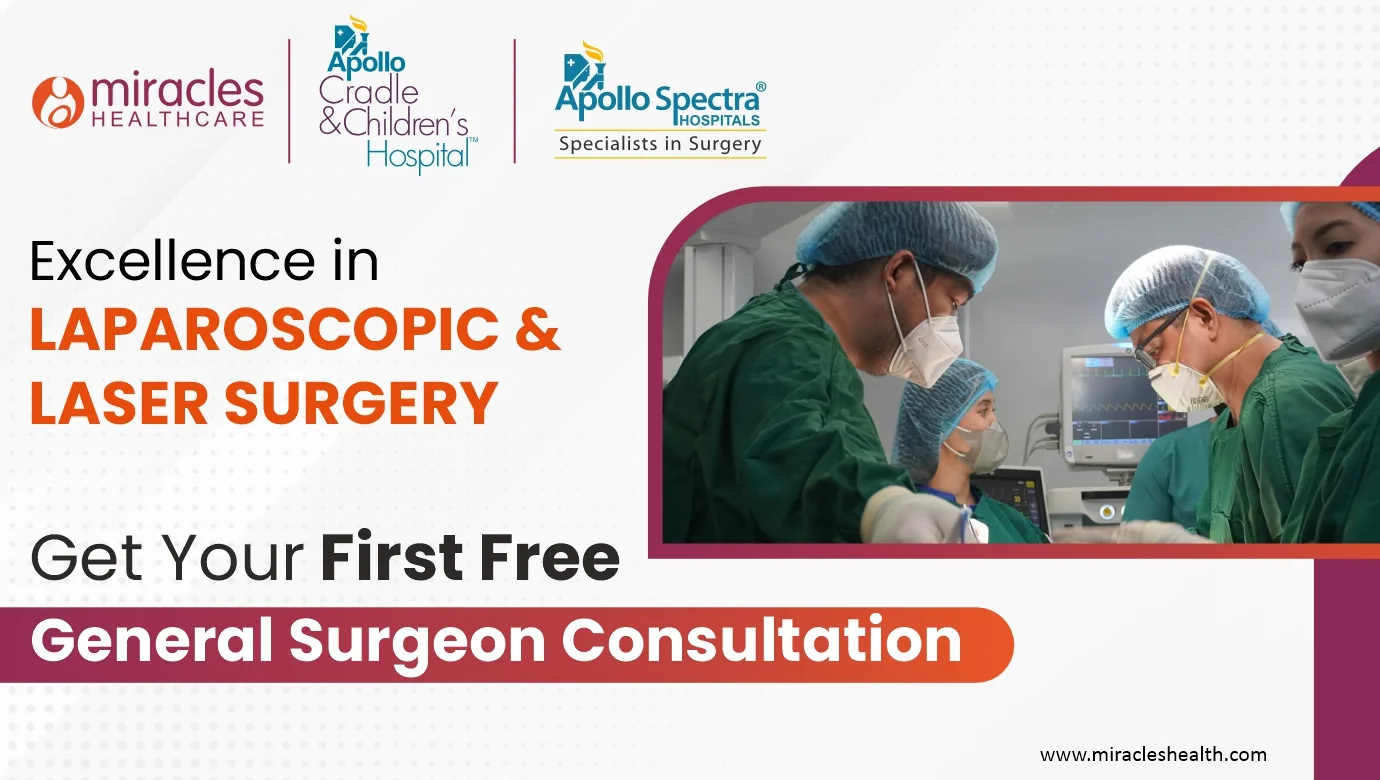General Surgery Conditions We Treat
Comprehensive Care for Your Health

Piles laser surgery, also known as haemorrhoidectomy, is a minimally invasive procedure. It aims to treat hemorrhoids, which are swollen veins in the rectum or anus causing discomfort and pain. It's considered a safe and effective solution for individuals suffering from hemorrhoidal discomfort. It offers relief and restores quality of life with minimal disruption.
Piles laser surgery is a procedure used to treat hemorrhoids, which are swollen and inflamed veins in the rectum or anus. It involves the precise targeting and removal of swollen hemorrhoidal tissue using a specialized laser, which effectively seals off blood vessels, reduces bleeding, and promotes faster healing.
This surgical approach is often preferred over traditional methods due to its numerous benefits, including reduced post-operative pain, shorter recovery times, and decreased risk of complications such as infection. Its minimally invasive nature has made it increasingly popular for treating hemorrhoids, providing patients with relief from symptoms.
Laser hemorrhoid surgery may be required for various reasons, including:
Severe pain and discomfort caused by inflamed hemorrhoids.
Persistent bleeding from hemorrhoids.
Hemorrhoids that do not respond to conventional treatments such as lifestyle modifications and medication.
Presence of large external hemorrhoids.
Chronic prolapse of internal hemorrhoids.
Recurrent hemorrhoid flare-ups impacting daily life and activities.
Cases where hemorrhoids lead to complications such as thrombosis or strangulation.
Medical recommendation based on the severity and persistence of hemorrhoidal symptoms.
The desire for a minimally invasive procedure with faster recovery times compared to traditional surgical methods.
Patients seeking a long-term solution for hemorrhoidal symptoms.
If you're considering Piles laser surgery and would like to learn more or discuss your options further, it's essential to consult with a qualified piles doctor near you. They help you provide personalized advice based on your specific condition, medical history, and treatment goals, whether Piles laser surgery is the right choice for you.
The right candidates for laser hemorrhoid surgery typically include individuals who:
Have persistent or severe symptoms of hemorrhoids, such as pain, bleeding, and discomfort, despite trying conservative treatments.
Experience recurrent hemorrhoid flare-ups that significantly affect their quality of life and daily activities.
Have large external hemorrhoids or internal hemorrhoids causing prolapse.
Suffer from hemorrhoids that lead to complications such as blood clots (thrombosis) or strangulation.
Have failed to respond to other minimally invasive procedures or medical management.
Desire a surgical solution with minimal post-operative pain and faster recovery times compared to traditional surgical methods.
Preparing for Piles laser surgery involves several steps to ensure a smooth and successful procedure.
Here's a guide on how to prepare for laser treatment for hemorrhoids
Consultation: Schedule an online consultation with your piles specialist to discuss the surgery, including its benefits, risks, and expected outcomes. Ask any questions you have and make sure you understand the procedure and what to expect during recovery.
Medical Evaluation: Undergo a thorough medical evaluation, which may include blood tests, imaging studies, and other diagnostic tests to assess your overall health and determine if you are fit for surgery.
Medication Review: Inform your surgeon about all medications you are currently taking, including prescription drugs, over-the-counter medications, vitamins, and supplements. Follow their instructions regarding your medications that need to be adjusted or discontinued before undergoing surgery.
Lifestyle Adjustments: Make necessary lifestyle adjustments, such as adopting a high- fiber diet and staying hydrated to prevent constipation, which can exacerbate hemorrhoidal symptoms post-surgery. Your piles' doctor may also recommend temporarily discontinuing certain medications like blood thinners to reduce the risk of bleeding during surgery.
Follow Fasting Guidelines: Follow fasting guidelines provided by your doctor, which typically involve refraining from eating or drinking anything for a certain period before the surgery to reduce the risk of complications related to anesthesia.
Quit Smoking: If you smoke, consider quitting or at least reducing smoking before surgery, as smoking can impair healing and increase the risk of complications.
Follow Pre-operative Instructions: Follow any specific pre-operative instructions provided by your surgeon, such as showering with special antibacterial soap or avoiding certain foods or drinks.
Mental Preparation: Mentally prepare yourself for the surgery by staying positive and focused on the benefits of the procedure.
By following these preparation steps and closely following your Piles specialist doctor's instructions, you can help ensure a successful Piles laser surgery and a smooth recovery process.
The procedure of piles laser surgery, or haemorrhoidectomy, is typically done as follows:
Anesthesia: Before the surgery starts, anesthesia is given to ensure they are comfortable and pain-free during the procedure. The type of anesthesia used may vary depending on the patient's medical condition.
Positioning: Once the anesthesia takes effect, the patient is positioned appropriately for the surgery. This may involve lying on their side, stomach, or back, depending on the specific technique being used by the surgeon.
Application of Laser: With the patient prepared, the surgeon begins the procedure by applying a specialized laser to the affected area. The laser energy is carefully directed to target and remove the swollen hemorrhoidal tissue precisely. The laser not only excises the hemorrhoids but also seals off nearby blood vessels, which helps minimize bleeding during and after the procedure.
Tissue Removal: Using the laser, the surgeon carefully removes the inflamed hemorrhoidal tissue. The goal is to alleviate symptoms and promote healing while minimizing trauma to the surrounding healthy tissue.
Closure: Once the hemorrhoidal tissue is removed, the surgeon chooses to close the open wound using sutures or other closure techniques. Now surgeons involve the use of an electrothermal device to both cut and seal the tissues and blood vessels.
Laser hemorrhoid surgery offers numerous advantages that make it a preferred option for many patients seeking relief from hemorrhoidal symptoms.
Here are several advantages over traditional surgical methods:
Minimally Invasive: Piles laser surgery is a minimally invasive procedure, which means it involves smaller incisions or cuts compared to traditional surgery. This often results in less tissue trauma, reduced post-operative pain, and faster recovery times.
Outpatient Procedure: In many cases, Piles laser surgery may be performed as an outpatient procedure, allowing patients to return home on the same day of surgery. This reduces the need for hospitalization and can lead to greater convenience for patients.
Precise Tissue Removal: The laser technology allows for exact targeting and removal of inflamed hemorrhoidal tissue. This helps minimize damage to surrounding healthy tissue and can lead to better outcomes for patients.
Faster Recovery: Due to its minimally invasive nature and reduced tissue trauma, Piles laser surgery leads to faster recovery times compared to traditional surgical methods. Post-operatively, patients may experience less pain and discomfort and can often return to their normal activities sooner.
Reduced Bleeding: Laser energy effectively cauterizes blood vessels as the surgeon removes the hemorrhoids, reducing the risk of excessive bleeding during and after the procedure. This can result in a safer surgical experience and faster healing.
Minimal Scarring: Laser technology allows for precise tissue removal, which can result in minimal scarring compared to traditional surgical techniques. This may be particularly advantageous for patients concerned about cosmetic outcomes.
Lower Risk of Complications: With reduced tissue trauma, less bleeding, and faster healing, Piles laser surgery carries a lower risk of complications such as infection, wound breakdown, or anal stenosis compared to traditional surgical methods.
Effective Treatment: Laser hemorrhoid surgery is an effective treatment option for individuals suffering from symptomatic hemorrhoids who do not respond to conservative treatments. It can provide long-lasting relief from symptoms such as pain, bleeding, itching, and discomfort.
However, it's important to consult with the best doctor for piles laser surgery near you to determine if this procedure is suitable based on individual circumstances and medical history.
After Piles laser surgery (Haemorrhoidectomy), patients can expect several things during the recovery period:
Pain and Discomfort: It's normal to experience some pain, discomfort, or a sensation of pressure in the anal area following surgery. Your surgeon will prescribe pain medications or recommend over-the-counter pain relievers to manage this discomfort.
Swelling: Swelling around the surgical site is common and may cause temporary discomfort. Your surgeon may recommend applying ice packs or using sitz baths to help reduce swelling and provide relief.
Bleeding: Minor bleeding or spotting from the surgical site may occur during the first few days after surgery. This is generally minimal and should gradually decrease as the healing process progresses.
Stool Changes: You may experience changes in bowel movements, including constipation or diarrhea, in the days following surgery. It's important to stay hydrated, eat a high-fiber diet, and use stool softeners as recommended by your surgeon to prevent straining during bowel movements and promote regularity.
Wound Care: Your surgeon will provide instructions on how to care for the surgical site, including keeping the area clean and dry, using prescribed topical medications or ointments, and avoiding strenuous activities that may irritate the area.
Follow-up Appointments: Follow up with your surgeon to monitor your progress and ensure proper healing. During these appointments, your surgeon may assess the surgical site for signs of infection or other complications.
Return to Normal Activities: While recovery times vary from person to person, most patients can expect to return to normal activities within a week to 10 days after surgery. However, strenuous activities such as heavy weight lifting, should be avoided until cleared by your surgeon.
Symptom Relief: Symptom Relief:
It's very important to follow all post-operative instructions given by your surgeon. With proper care and patience, most patients can expect a successful recovery and long-term relief from hemorrhoidal symptoms after Piles laser surgery.
After Piles laser surgery (Haemorrhoidectomy), it's important to follow specific care instructions provided by your surgeon to promote healing and reduce the risk of complications. Here are some general care guidelines:
Keep the surgical area clean and dry. Gently clean the area with warm water after bowel movements and pat it dry with a soft cloth or toilet paper. Avoid rubbing or wiping vigorously.
Follow your surgeon's instructions regarding the use of topical medications or ointments to promote healing and reduce discomfort.
If recommended, use medicated wipes to soothe the area and reduce inflammation.
Take prescribed pain medications as your surgeon directs or use over-the- counter pain relievers as recommended.
Apply ice packs or cold compresses to the anal area to help reduce swelling and alleviate pain.
Follow a high-fiber diet to prevent constipation and promote regular bowel movements. Include plenty of fruits, vegetables, whole grains, and pulses in your diet.
Drink plenty of water to stay hydrated and soften stools, making them easier to pass. Avoid caffeinated and alcoholic beverages, as they can contribute to dehydration and exacerbate constipation.
Stool Softeners: Take stool softeners or laxatives as recommended by your surgeon to prevent straining during bowel movements and reduce discomfort. Avoid straining or bearing down, as this can put pressure on the surgical site and delay healing.
Avoid Straining: Straining can increase pressure on the rectum and hinder the healing process. Avoid heavy lifting, strenuous exercise, or activities that may strain the surgical area for at least a few weeks after surgery.
Sitz Baths: Take sitz baths several times a day to help soothe the anal area, reduce swelling, and promote healing. Dry the area thoroughly afterward.
Hygiene: Practice good hygiene, including showering regularly and gently patting the anal area dry after washing. Avoid using harsh soaps or perfumed products that may irritate the surgical site.
Follow-up Care: Follow up with your surgeon as scheduled. Your surgeon will monitor your progress, remove any sutures if necessary, and address any concerns or complications that may arise.
Rest and Recovery: Give yourself time to rest and recover following surgery. Avoid prolonged sitting or standing and take breaks to lie down and elevate your legs if needed.
Contact Your Surgeon: if you experience severe pain, continuous bleeding, fever, signs of infection such as redness, swelling, or drainage from the surgical site, or any other concerning symptoms during the recovery period, contact your surgeon immediately.
By following the care instructions by your surgeon, you can help ensure a smooth recovery and successful outcome after Piles laser surgery.
While Piles laser surgery is generally considered safe, like any surgical procedure, it carries some potential risks and complications. These may include:
Bleeding: Some degree of bleeding is normal after Piles laser surgery, but excessive bleeding can occur in rare cases. Patients may need additional treatment to control bleeding.
Infection: There is a chance of infection at the surgical site or in the surrounding tissues. Signs of infection may include increased pain, redness, swelling, warmth, or drainage from the incision site. Immediate medical attention is required if infection is suspected.
Pain and Discomfort: While Piles laser surgery generally results in less post-operative pain compared to traditional surgery, some patients may still experience discomfort, especially during bowel movements or sitting for extended periods.
Urinary Retention: Difficulty urinating or urinary retention may occur temporarily after surgery due to swelling or irritation of the surrounding tissues. This usually resolves on its own but in some cases, it may require medical intervention.
Allergic Reactions: Some patients may experience allergic reactions to medications, anesthesia, or other substances used during surgery.
Chronic Pain: In some cases, patients may experience chronic pain or discomfort after surgery, particularly if nerve damage occurs during the procedure.
Anal Stenosis: Narrowing of the anal canal may occur as a result of scarring or tissue healing improperly. This may lead to difficulty with complications such as bowel movements.
Recurrence of Hemorrhoids: While Piles laser surgery is effective in removing hemorrhoids, there is a chance of recurrence over time. This may require additional treatment.
Fecal Incontinence: In rare cases, Piles laser surgery may lead to the inability to control bowel movements due to damage to the anal sphincter muscles or nerves.
Anesthesia Risks: General anesthesia carries its risks, including allergic reactions, respiratory problems, or adverse reactions to medications used during anesthesia.
Discussing these risks and any concerns with your surgeon before undergoing Piles laser surgery is important. Your surgeon will provide you with information about how to minimize these risks and will monitor your progress closely during the recovery period to address any complications that may arise.
The Piles laser treatment cost can vary based on several factors. One significant factor is the geographic location of the healthcare facility where the surgery is performed. Costs may differ between urban and rural areas and may also vary by region due to differences in healthcare infrastructure, labor costs, and overhead expenses. Additionally, the experience and expertise of the surgeon performing the procedure can influence the cost, with more experienced surgeons typically charging higher fees. The specific type of laser technology used during the surgery may also affect the cost, as newer or more advanced laser systems may come with higher price tags. Other factors that can impact the cost include the complexity of the procedure, any additional services or treatments provided, such as pre-operative consultations, post- operative care, and follow-up appointments, as well as any potential complications that may arise during or after the surgery. Patients are advised to consult at the Piles Laser Treatment hospital near you to know about the exact costs associated with Piles laser surgery and to inquire about financing options or insurance coverage, if applicable.
Miracles Apollo Cradle/Spectra stands out as the premier choice for laser piles surgery in Gurgaon, renowned for its expertise and excellence in the field. With a dedicated team of piles specialists, including top-rated doctors and surgeons, we offer unparalleled care for patients seeking relief from piles-related ailments. Our leading-edge technology and advanced surgical techniques, coupled with the expertise of the best piles surgeon in Gurgaon, ensure superior outcomes and patient satisfaction. Whether it's diagnosis, treatment, or post-operative care, we provide comprehensive and compassionate services tailored to individual needs. For anyone in search of the most reliable and effective treatment for piles in Gurgaon, we emerge as the definitive choice, setting the benchmark for quality healthcare in the region.
If you are looking for the best piles doctor near you in Gurgaon for laser hemorrhoid surgery, contact us to book an online appointment.


Comprehensive Care for Your Health
Meet our expert team of General Surgeon where compassionate care meets expertise.
Inspiring Journeys: True Patient Stories
Miracles Healthcare is a leading multispeciality hospital in Gurgaon. We are committed to providing comprehensive and high-quality medical care across all specialties under one roof.






Your Health, Our Network: Comprehensive Care Across Every Facility.
Learn about the world class health care we provide
Expert Advice and Health Tips
Learn about the world class health care we provide
Piles laser surgery can effectively treat various conditions related to hemorrhoids, including internal and external hemorrhoids, thrombosed hemorrhoids, and hemorrhoids with complications such as bleeding or prolapse.
Laser surgery can be a good option for treating piles, as it offers several advantages over traditional surgical methods, including reduced pain, faster recovery times, and minimal post- operative complications.
Hemorrhoidectomy is a common but effective surgery performed to remove severe piles; it is safe when done by an experienced surgeon and followed by proper recovery care.
Some pain or discomfort is normal after hemorrhoidectomy surgery, but it can be well-managed with medications and proper post-operative care.
Miracles Apollo Cradle/Spectra is the best hospital for hemorrhoidectomy in Gurgaon, offering expert surgeons, advanced techniques, and faster recovery.
Recovery from piles laser surgery typically takes around 1 to 2 weeks, although individual recovery times may vary based on factors such as the extent of the surgery and the patient's overall health.
Grade 4 piles, which are severe and may involve prolapse and thrombosis, can be treated with laser surgery. However, the suitability of laser surgery for Grade 4 piles should be determined by a healthcare provider based on individual circumstances and medical history.
The surgery usually takes about 30 to 60 minutes, depending on the size and number of hemorrhoids being removed.
Drink plenty of water, eat a fiber-rich diet, and take stool softeners as advised by your doctor to make bowel movements easier and pain-free.
Yes, piles surgery is highly successful when performed by skilled surgeons, though maintaining a healthy lifestyle helps prevent recurrence.